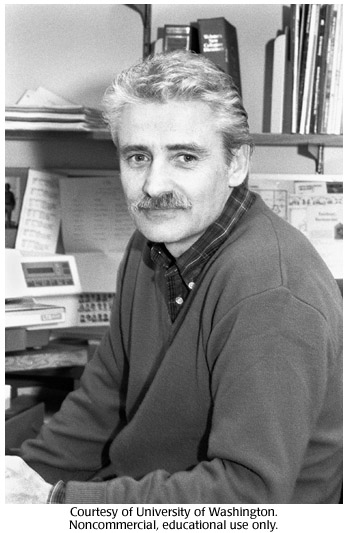Gallery 38: Leland Hartwell

Leland Hartwell, President and Director of the Fred Hutchinson Cancer Research Center.
fred hutchinson cancer research, leland hartwell, fred hutchinson cancer, fred hutchinson cancer research center, cancer research center, hutchinson cancer research center
- ID: 16786
- Source: DNALC.DNAFTB
Related Content
16806. Biography 38: Leland Hartwell (1939 - )
Lee Hartwell was one of the first to use yeast as a model system, and he identified many of the genes involved in the cell cycle.
979. Causes, Diet: Diet and Cancer, Nelson clip 1
Professor Nelson discusses how ecological epidemiology evidence is utilized to determine cancer susceptibility.
983. Causes, Diet: Cause, Nelson
Professor Nelson explains that GSTP1 doesn't seem to be a gene in prostate cancer at least that's controlling growth, invasion, or metastasis.
16522. Video 23: Richard McCombie, clip 1
Comments about the way sequencing is done as developed by Fred Sanger and now.
16995. New York Stories: Restriction Enzyme Analysis
New York high school students interview Dr. Scott Lowe of Memorial Sloan-Kettering Cancer Center about using restriction enzyme analysis in cancer research, then perform the experiment.
981. Causes, Diet: Diet and Cancer, Nelson clip 3
Professor Nelson explains that the prostate is actually a male sex accessory gland that contributes about a third of the secretions to the ejaculate for sexual reproduction.
1008. Diagnosis, Pathology: Demarzo clip 3
Professor Angelo De Marzo explains that if you think about the cells as a community of people, normal people would be a group of students in a lecture that are kind of sitting with their shirts and ties nice and orderly.
1007. Diagnosis, Pathology: Demarzo clip 2
Professor Angelo De Marzo explains that special dyes are utilized to stain cells and when we look at the stained cells under the microscope we look for changes in the architecture of cells.
16839. Gallery 40: Harold Varmus
Harold Varmus, President and Chief Executive Officer of Memorial Sloan-Kettering Cancer Center.
985. Causes, Diet: Prevention, Nelson
Professor Nelson explains that chlorophyll is a remarkable energy scavenger and that there is some hint that if you consume chlorophyll you can intercept chemical species, that damage proteins, DNA, and RNA.












